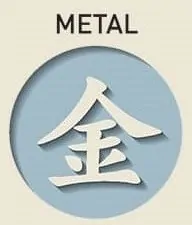The Metal Element in Chinese Philosophy
In the rich tapestry of Chinese philosophy, the concept of the five elements – Wood, Fire, Earth, Metal, and Water – serves as a cornerstone for understanding the universe and the intricate dynamics of existence. Among these elements, Metal holds a unique and fascinating position, symbolizing strength, clarity, and refinement. Let’s embark on a journey to unravel the profound symbolism and significance of the Metal element in Chinese philosophy.
Understanding the Symbolism of Metal
Metal represents the essence of solidity and precision, embodying qualities such as discipline, organization, and discernment. Just as metal is forged through intense heat and pressure, Metal symbolizes the process of refinement and transformation, where raw materials are shaped into objects of beauty and utility. In Chinese cosmology, Metal is associated with the west, the direction of the setting sun and the waning of daylight, underscoring its connection to closure and completion.
Characteristics of the Metal Element
Individuals born under the influence of the Metal element are often characterized by their focus, determination, and attention to detail. They possess a keen intellect and a natural inclination towards structure and order, akin to the precision of a finely crafted instrument. Metal individuals are known for their strong sense of ethics and integrity, adhering steadfastly to principles and values even in the face of adversity.
Moreover, Metal personalities exhibit a refined aesthetic sensibility and an appreciation for beauty and elegance in all its forms. Like the enduring strength of metal alloys, they demonstrate resilience and endurance in overcoming challenges, forging ahead with unwavering resolve and determination.

The Interplay of Metal with Other Elements
In the dynamic interplay of the five elements, Metal interacts with each element in distinct ways, shaping the flow of energy and influencing various aspects of life. Metal is nurtured by Earth, as earth provides the minerals and ores from which metal is extracted and refined. Similarly, Metal controls Wood, as metal axes can cut down trees, symbolizing the capacity to impose order and structure on the forces of growth and expansion.
However, Metal is also susceptible to the transformative power of Fire, as intense heat can melt and reshape metal into new forms. Conversely, Metal exerts control over Fire, as metal implements can contain and control the flames, symbolizing the ability to temper passion and impulsivity with discipline and restraint.
Applications in Traditional Chinese Medicine
In Traditional Chinese Medicine (TCM), the Metal element corresponds to the lungs and large intestine meridians, which govern respiration, elimination, and the exchange of energy and information. Imbalances in the Metal element can manifest as respiratory disorders, skin conditions, or emotional disturbances like grief and sadness.
Practitioners of TCM employ various modalities, including acupuncture, herbal medicine, and qigong, to restore harmony and balance to the Metal element and the body as a whole. By fostering a free flow of qi (life force energy) and eliminating stagnation or obstruction, TCM seeks to promote optimal health and well-being.
Cultural and Symbolic Significance
Metal holds profound cultural and symbolic significance in Chinese culture, reflecting notions of authority, prestige, and honor. The ancient art of metallurgy, dating back thousands of years, exemplifies the mastery of craftsmen in shaping and transforming raw materials into objects of enduring beauty and utility.
Moreover, Metal is associated with concepts of wealth and prosperity, as seen in traditional Chinese customs like the exchange of gold and silver ornaments during weddings and celebrations. Metal objects are also imbued with symbolic meanings, serving as talismans of protection and good fortune in everyday life.
Conclusion
In conclusion, the Metal element occupies a central place in Chinese philosophy, symbolizing strength, clarity, and refinement. Its profound symbolism extends to various aspects of life, from personality traits and interpersonal relationships to health and well-being. By understanding the attributes and characteristics of the Metal element, we can gain insights into the natural cycles of transformation and evolution, fostering harmony and balance in our lives and the world around us.